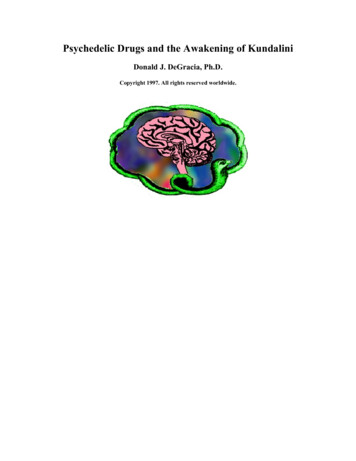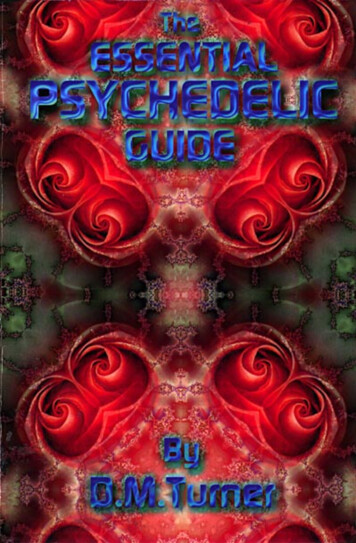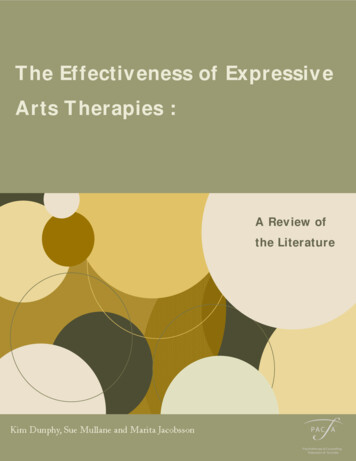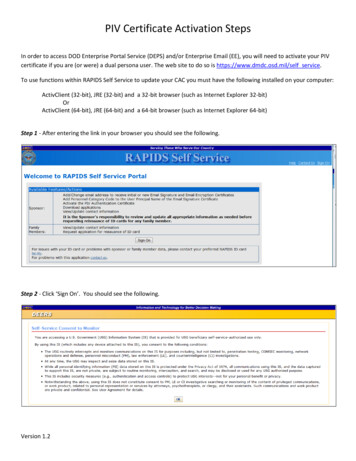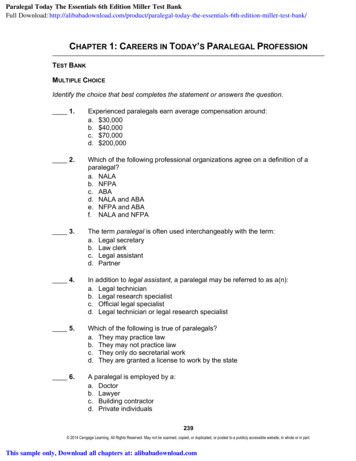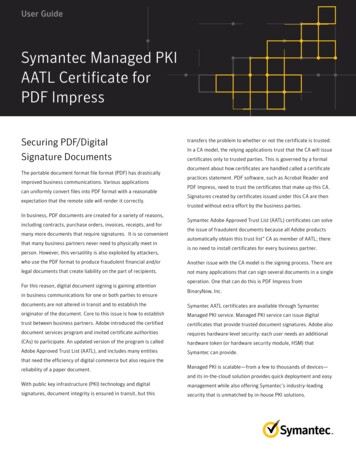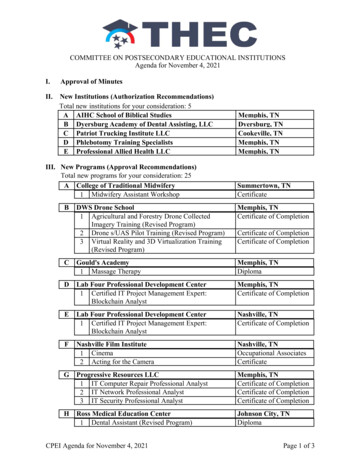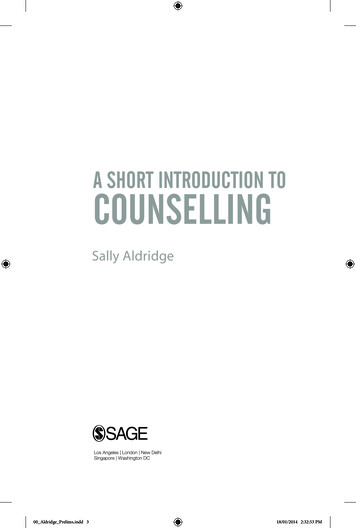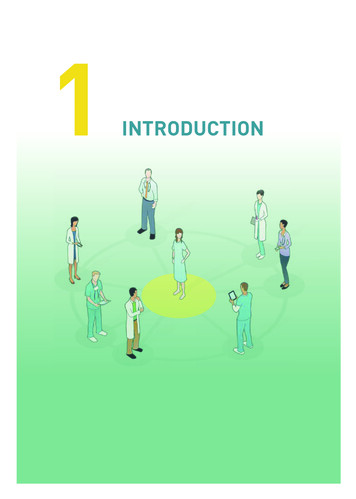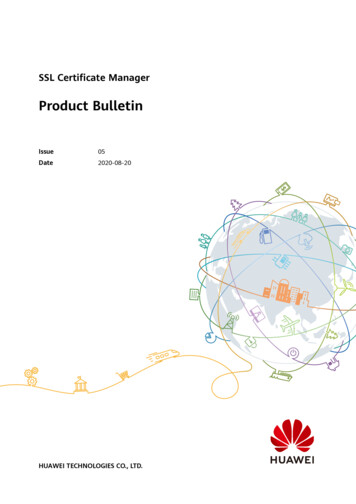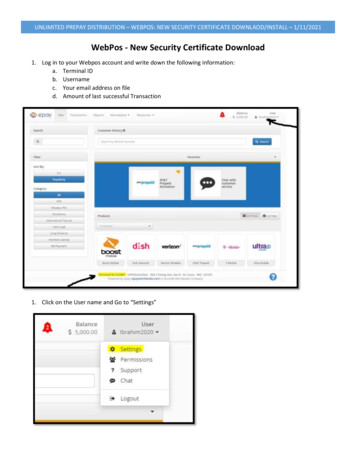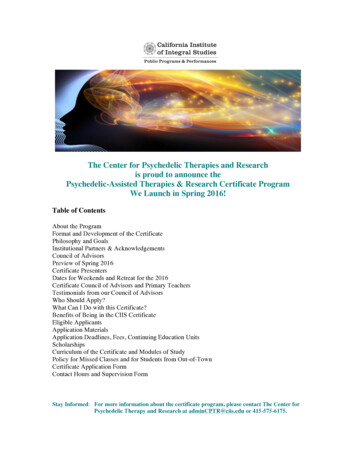
Transcription
The Center for Psychedelic Therapies and Researchis proud to announce thePsychedelic-Assisted Therapies & Research Certificate ProgramWe Launch in Spring 2016!Table of ContentsAbout the ProgramFormat and Development of the CertificatePhilosophy and GoalsInstitutional Partners & AcknowledgementsCouncil of AdvisorsPreview of Spring 2016Certificate PresentersDates for Weekends and Retreat for the 2016Certificate Council of Advisors and Primary TeachersTestimonials from our Council of AdvisorsWho Should Apply?What Can I Do with this Certificate?Benefits of Being in the CIIS CertificateEligible ApplicantsApplication MaterialsApplication Deadlines, Fees, Continuing Education UnitsScholarshipsCurriculum of the Certificate and Modules of StudyPolicy for Missed Classes and for Students from Out-of-TownCertificate Application FormContact Hours and Supervision FormStay Informed: For more information about the certificate program, please contact The Center forPsychedelic Therapy and Research at adminCPTR@ciis.edu or 415-575-6175.
AbouttheProgramThis Certificate will be housed in the new CIIS Center for Psychedelic Therapies and Research at CIISPublic Programs. The Center will also provide diverse public education about psychedelic research and theclinical use of psychedelics in psychotherapy from the past decades, as well as teaching on topics such asconsciousness studies, comparative mysticism, research on creativity enhancement with psychedelics andharm reduction techniques. Book readings on psychedelics and entactogens have been presented and a filmseries is being planned.The Psychedelic-Assisted Therapies and Research Certificate serves a growing need for the training ofskilled therapist researchers who will ideally seek advanced training for future FDA approved psychedelicassisted and entactogen-assisted psychotherapy research. Enrollees will be licensable/licensed professionalsin specific mental health and medical professions or eligible ordained/commissioned clergy and chaplains.The roots of this Certificate are in the work of scholars and researchers on psychedelic-assistedpsychotherapies, transpersonal psychology, consciousness studies, psychoanalysis, mysticism, andanthropology. While this Certificate will emphasize the therapeutic models of psychedelic research, we willaddress the philosophy and theory from these other scholarly traditions as well. CIIS has an outstandingreputation of 50 years in graduate education that integrates consciousness studies, spirituality andpsychology, including psychedelic studies.FormatandDevelopmentoftheCertificateThe format of instruction and curriculum has been developed by Dr. Janis Phelps, Director of the Center forPsychedelic Therapies and Research, in collaboration with many clinicians and researchers in the field. Asformer Dean of Faculty for the School of Humanities and Social Sciences, Janis Phelps is well positionedto create a multidisciplinary team of teachers from across the United States and Canada. The Certificateprogram will be conducted during an 8 month period and is comprised of 10 weekend workshops and a 4day intensive retreat. The curriculum entails 180 total hours of instruction. The learning environment willbe in the form of lectures, small group discussion, experiential learning (e.g., Holotropic Breathwork, roleplay, guided imagery, expressive arts, journaling) and applied work in clinical and therapeutic settings. Wewill meet approximately every 3 weeks, except in the summer. Classes begin at the end of March, 2016.We meet until the end of June, then have the summer off for volunteer work, and meet again from earlySeptember through early December, 2016. The 4-day June retreat at the Marconi Conference Center inMarshall, California is a shortened version of the MAPS training program for therapist guides. The MAPSfounding trainers, Dr. Michael Mithoefer and Annie Mithoefer, RN, will be our retreat's expert instructors.Many psychiatrists, psychologists and therapists from Johns Hopkins University, New York University,UCLA, University of California, Berkeley, and the University of Wisconsin will be teaching in theprogram. Stanislav Grof, Ralph Metzner, other CIIS faculty, and Bay Area experts will complete thecertificate nt with CIIS ideals, this certificate strives to encompass all aspects of learning:intellectual/didactic, the personal/experiential and applied (clinical and pastoral work). The research andtherapy training will be done with processes embedded in self-reflection, community-building andembodied ways of knowing and mentoring. The global wisdom traditions related to alterations ofconsciousness (meditation, yoga, fasting, solo wilderness retreats, healing methods, etc.) will play a role inthe theoretical underpinnings of the curriculum as well as being directly enacted as part of thepersonal/experiential aspect of the training. It is important to note that at no time in the program will therebe the promotion or requirement of the use of psychedelic drugs in any settings, whether recreational,2
therapeutic or sacred. Students earning the Certificate will learn to be therapist guides for federallyapproved medical treatment and psychedelic research.Our purpose is to mentor new therapist guides to become leaders in the next generation of professionals inpsychedelic-assisted psychotherapy. Our graduates will have a deeper understanding of the nature of thesetransformative processes and multiple skills with which to provide therapeutic and loving support for aperson's natural healing any renowned researchers and scholars have advised and supported the development of this certificateprogram at CIIS. They represent the prominent U.S. and Canadian research centers that are funded by theHeffter Research Institute (HRI), Multidisciplinary Association of Psychedelic Studies (MAPS), theCouncil on Spiritual Practices (CSP) and the Usona Institute.We would like to publicly thank the following key thinkers and researchers for their significantcontributions to the development of this Certificate. They co-inspired with the Janis Phelps to bringtogether a wealth of engaging ideas and training processes as the basis for this program. Thank you toAnthony Bossis and Jeffrey Guss (NYU); Karen Cooper, Nicholas Cozzi and Dan Muller (U. ofWisconsin); Rick Doblin, Michael Mithoefer and Annie Mithoefer (MAPS); Roland Griffiths and WilliamRichards (Johns Hopkins U.); Charles Grob (UCLA); Stanislav Grof; Bob Jesse (CSP and Heffter); RalphMetzner; and David Nichols (Heffter Co-Founder). Many of these researchers are featured in the influentialNew Yorker article by Michael Pollan from earlier this trip-treatment.We give a deeply felt and hearty acknowledgement especially to Dr. William Richards of Johns HopkinsUniversity for his tireless, consistently inspired and wise counsel on multiple levels of this Certificate.Council of AdvisorsMany of these advisors will be teaching in the Certificate and some will be guest lecturers in eveningpublic events at CIIS, co-sponsored by Public Programs and the Center for Psychedelic Therapies andResearch. Many local Bay Area experts in the field will be certificate teachers as well.Michael Bogenschutz, MDProfessor of Psychiatry, New York University School of Medicine, Psilocybin and Alcohol Dependence ResearchProjectsAnthony Bossis, PhDClinical Assistant Professor of Psychiatry, New York University School of Medicine; Director of Cancer and PalliativeCare Research, New York University Psilocybin Cancer ProjectKaren M. Cooper, RN, MAUsona Institute Senior Clinical Research Nurse, University of Wisconsin School of Pharmacy, PsilocybinPharmacokinetic Study3
Mary Cosimano, MSWStudy Coordinator, Department of Psychiatry & Behavioral Sciences, Johns Hopkins School of MedicineNicholas Cozzi, PhDProfessor of Pharmacology, U. of Wisconsin; Director, Neuropharmacology Laboratory, University of WisconsinSchool of Medicine and Public Health; Fellow and Trustee, Alexander Shulgin Research InstituteAlicia Danforth, PhDResearcher, Los Angeles Biomedical Research Institute, Harbor-University of California, Los Angeles Medical CenterRick Doblin, PhDFounder and Executive Director, Multidisciplinary Association for Psychedelic StudiesDonna Dryer, MDAdvisory Board Member & Primary Investigator, Multidisciplinary Association for Psychedelic Studies CanadaGeorge Goldsmith, MAChairman and Founder, Tapestry Networks; Consultant, Heffter Research Institute & Multidisciplinary Association forPsychedelic StudiesElizabeth GordonBoard Member, Heffter Research Institute; Trustee, California Institute of Integral StudiesGeorge Greer, MDCo-Founder, Medical Director, and Board Member, Heffter Research Institute; Distinguished Fellow, AmericanPsychiatric Association; Past President, Psychiatric Medical Association of New MexicoRoland Griffiths, PhDProfessor of Neuroscience and Psychiatry & Behavioral Sciences, Johns Hopkins University School of MedicineCharles Grob, MDCo-Founder of Heffter Research Institute; Professor of Psychiatry & Pediatrics, UCLA School of Medicine; Director& Chief of Div. of Child & Adolescent Psychiatry at Harbor-UCLA Medical CenterStanislav Grof, MD, PhDProfessor Emeritus of Philosophy, Cosmology, and Consciousness, California Institute of Integral Studies; FoundingPresident, International Transpersonal AssociationJeffrey Guss, MDClinical Assistant Professor of Psychiatry, New York University School of Medicine; Director of Psychedelic TherapyTraining, New York University Psilocybin Cancer ProjectDiane Haug, MA, LPCCSenior Staff, Grof Transpersonal Training; Adjunct Faculty, Southwestern College & Academy for the Love ofLearning and California Institute of Integral StudiesBob JesseFounder, Council on Spiritual Practices; Former Vice President, Oracle; Collaborator, Johns Hopkins UniversityResearchMatthew Johnson, PhDProfessor of Psychiatry & Behavioral Sciences, Johns Hopkins University School of Medicine4
Gabor Mate, MDAuthor of In the Realm of Hungry Ghosts: Close Encounters with Addiction and When the Body Says No: The Cost ofHidden StressDennis McKenna, PhDCo-founder, Director of Ethnopharmacology and Board Member, Heffter Research Institute; Assistant Professor,Center for Spirituality and Healing, University of Minnesota Academic Health CenterRalph Metzner, PhDCo-founder and President, Green Earth Foundation; Professor Emeritus of Psychology, CIISAnnie Mithoefer, BSN, RNClinical Investigator for MDMA/PTSD Studies, Multidisciplinary Association for Psychedelic StudiesMichael Mithoefer, MDClinical Investigator for MDMA/PTSD Studies, Multidisciplinary Association for Psychedelic StudiesDaniel Muller, MD, PhDProfessor of Rheumatology, U. of Wisconsin School of Medicine and Public Health; Principle Investigator, PsilocybinPharmacokinetic StudyDavid Nichols, PhDCo-Founder, President and Director of Pre-Clinical Research, Heffter Research Institute; Distinguished ProfessorEmeritus of Purdue University; Former Robert C. & Charlotte P. Anderson Chair of Pharmacology, PurdueUniversity; Adjunct Professor, University of North Carolina, Chapel HillJanis Phelps, PhDChair, Council of Advisors; Professor of East-West Psychology; Director of the Center for Psychedelic Therapies &ResearchWilliam Richards, STM, PhDClinical Psychologist, Psychiatry & Behavioral Sciences, Johns Hopkins University School of MedicineStephen Ross, MDProfessor of Psychiatry and Child and Adolescent Psychiatry, New York University School of Medicine; PrincipalInvestigator, New York University Psilocybin Cancer Project; Clinical Director, New York University Langone Centerof Excellence on Addiction; Director, New York University Addiction Psychiatry FellowshipAnn ShulginAlexander Shulgin Research InstituteRichard Yensen, PhDAdvisory Board Member & Researcher, MAPS Canada; Founder and Director, Orenda Dr. Susana Bustos (CIIS)Dr. Nick Cozzi (University of Wisconsin)Dr. Rick Doblin (Tentative - MAPS Founder)Dr. George Greer (Heffter Co-founder)Dr. Stanislav GrofDr. Jeffrey Guss (New York University)Diane Haug (Grof Transpersonal Training)Bob Jesse (Council on Spiritual Practices)Dr. Michael Mithoefer (MAPS, 4-day June training retreat)Annie Mithoefer (MAPS, 4-day June training retreat)Dr. David Nichols (Heffter Co-founder)Dr. Janis Phelps (CIIS)Dr. David Presti (UC Berkeley)Dr. Bill Richards (Johns Hopkins University)(Fall 2016 Presenters will be posted soon.)5
DatesforWeekendsandRetreatforthe2016CertificateThe schedules for these weekends are: Fridays from 3 pm. - 9 pm. and Saturdays from9:30 am. - 5 pm. Those weekends with an * have an additional Sunday morning which meets from10 am. – 1 pm. The retreat occurs Sunday to Thursday, June 5 - 9, 2016. These are the assigned dates forthe certificate weekends and the exact schedule with presenters will be announced shortly.Inaugural Weekend: March 25 and 26, 2016April 8, 9 and 10 *April 29 and 30May 13, 14 and 15 * Holotropic Breathwork weekendJune 5 - 9 (4-day Training Retreat with the Mithoefers of MAPS at Marconi Conference Center)June 24 and 25SUMMER BREAKSeptember 9 and 10September 30, October 1 and 2 * Holotropic Breathwork weekendOctober 14 and 15November 4 and 5November 18 and 19December 2 and 3Testimonials from our Council of AdvisorsFrom Dr. William Richards, scholar, clinician and researcher at Johns Hopkins University:"Accompanying the rebirth of psychedelic research and its many promising clinical, educational andreligious applications, CIIS has stepped forward to design a program that not only offers techniques andinformation, but that also nurtures the psychological and spiritual maturation of future investigators andpractitioners. It is an honor to be associated with CIIS and to contribute to the rich unfolding of thiseducational trajectory."From Dr. Anthony Bossis, clinician, researcher and scholar at New York University:"I am delighted to contribute to of The Center for Psychedelic Research and Therapies at CIIS. The returnof government approved scientific research into psilocybin and related compounds has significant potentialfor myriad scientific and clinical studies including the important treatment of existential and psychospiritual distress at the end of life. The re-emergence of this field will require serious multi-disciplinaryacademic centers to address the theoretical, research, and clinical domains of this work. With its historyintegrating psychology and spirituality, CIIS is uniquely and enormously qualified to meet this historicchallenge."6
WhoShouldApply?The Certificate is designed for advanced professionals working in related therapeutic areas: licensed mentalhealth clinicians, specific medical professionals and ordained/commissioned clergy and chaplains. Underspecific circumstances, prospective medical and mental health profession students, who are not yetlicensed, may apply if they have completed their coursework and 1,000 training hours of counseling andpsychotherapy. Licensed Professional Clinical Counselors (LPCC)Marriage and Family Therapists (LMFT)Licensed Clinical Social Workers (LCSW)Registered Nurses (RN)Nurse Practitioners (NP)NaturopathsOrdained/Commissioned Clergy and ChaplainsPhysician AssistantsClinical and Counseling PsychologistsPhysicians and PsychiatristsWhat Can I Do with this Certificate in Psychedelic-Assisted Therapies & Research?Two primary opportunities could await you as a Certificate graduate:Our Certificate graduates will have a strong foundation in skills and knowledge at a high standard for entrylevel training, which will ideally be finalized in advanced training at a psychedelic-assisted and/orentactogen-assisted psychotherapy research center affiliated with MAPS or HRI. We use the term"psychedelic" in this certificate summary to refer to both the classic psychedelics (LSD, psilocybin, peyote,ayahuasca, etc.) and to those drugs specifically called "entactogens" and also known as “empathogens”(MDMA, MDA, etc.). Research therapists in this field are sometimes termed sitters or guides. Graduates ofthe Certificate can seek further training as therapist guides in HRI or MAPS funded, FDA-approvedresearch studies. Over the next years in the Bay Area, we will be developing several psychedelic-focusedresearch initiatives with other clinician researchers. Some of the Certificate graduates, pending pursuit offurther HRI or MAPS advanced training, could be brought in to sit as study therapists in these ongoingresearch projects.Many experts in psychedelic-assisted psychotherapy research are predicting that in 2-3 years the leadingpsychedelic researchers will initiate applications for expanded access approvals to the FDA for MDMA andpsilocybin. Expanded access for investigational drugs is designed for medicines that have been determinedby the FDA to have sufficient efficacy and baseline safety, but are not yet fully approved for the researchedsymptomologies. If approved by the FDA, psychiatrists and some physicians will be able to prescribepsilocybin and/or MDMA during the expanded access period for people with intractable conditions that7
have shown only partial response to traditional medications or for whom traditional medicines arecontraindicated. In these cases, carefully trained therapist researchers will need to be present throughout theprocess as guides, under supervision of the physician, and working within strict FDA treatment protocols.While the FDA’s response to the applications will not be known until then, the first permitted expandedaccess might be for people whose medical conditions meet FDA criteria for severe chronic PTSD (forMDMA) and advanced cancer anxiety and distress (for psilocybin). At CIIS we are working at the forefrontof these potential opportunities. Join us!Overviews of Expanded cm351748.htmRead more about Expanded Access & Compassionate s on FDA D c859616b5a665bbcda13092d0c1c063d&node sp21.5.312.i&rgn chedelic- ‐AssistedTherapies&Research?By enrolling in this Certificate, you will:Have a unique opportunity to train with many of the prominent psychedelic researchers and therapist guidesin the United States & Canada.Be mentored in monthly supervision with an expert clergy member, clinician and/or researcher in the fieldof psychedelic-assisted psychotherapies.Become a member of the Founding Year of the CIIS Certificate & of the next generation of therapist guidesfor psychedelic-assisted psychotherapies.Develop your clinical and/or spiritual direction skills to an advanced level of expertise that integratessacred knowledge, new levels of skill in therapeutic presence, improved research knowledge, and renewedconnection to your own inner healer.Learn to be present to the ways in which you can more deeply promote your own personal journey oftransformation & well-being.Enjoy the support & conviviality of a cohort of clergy, therapists, chaplains & medical professionals withwhom you might practice and/or conduct research in the future.8
Join an engaged & healing classroom atmosphere that nurtures our human capacity for spiritual aliveness,well-being & community.Expand your scope of practice within your profession to include skills and insights from the certificationtraining that would allow you to more ably help people navigate through life's challenging and difficultstates of consciousness.Take advantage of applicable continuing education credits for this Certificate.APPLICATION onals, who hold advanced degrees, licensure, commissions or ordinations, may apply to thecertificate program if they are a: Licensed Professional Clinical Counselor (LPCC) Marriage and Family Therapist (LMFT) Licensed Clinical Social Worker (LCSW) Registered Nurse (RN) Nurse Practitioner (NP) Naturopath Ordained/Commissioned Clergy and Chaplains Physician Assistant Clinical and Counseling Psychologist Physician and PsychiatristOnly those people with the above degrees and credentials are eligible to apply. For these professionals,preference will be given for applicants with a background in psychological treatment and spiritual directionin these areas: behavioral medicine, chronic trauma, palliative care, hospice, drug and alcoholrehabilitation, oncology, pain management and/or psychiatry.Ordained clergy and commissioned/ordained chaplains are considered as applicants if they serve within thewell-known world spiritual traditions. For ordained/commissioned clergy and chaplains, a M.Div., MA. orCPE with study in psychology and therapeutic skills is preferred. For medical professionals, clergy andchaplains, those applicants with substantial experience in providing psychotherapy, counseling, pastoralcare and/or spiritual direction will be considered strong candidates for the certificate program.Special Case Eligibility for Pre-licensed Professionals: Under certain circumstances, the mental health ormedical professionals in the above list may be admitted prior to the completion of licensure requirements.Clergy and chaplains need to be ordained or commissioned at the time of application. Eligible mentalhealth and medical professionals who are not yet licensed will be considered on an individual basis only ifthey: a) will have completed their degree coursework and b) will have completed 1,000 or more supervisedinternship or residency clinical hours in which they conducted psychotherapy and counseling. In all cases9
where such an applicant is unlicensed, the degree's coursework units and the 1,000 supervised hours ofpsychotherapy or counseling experience need to be completed prior to the start of the certificate program,March 25, 2016.For most of these professions in this special case, this means that the degree units are completed, with onlythe remaining clinical practice or research requirements remaining. To document the completion of thecoursework, please include a copy of your university's requirements in the catalog for your degree'sacademic units along with your transcript. To document the supervised clinical and counseling hours,complete the Contact Hours and Supervision Form. If you have received your degree, but are not yetlicensed, then you only need to submit your transcript showing degree conferral and the appropriatedocumentation of the 1,000 supervised psychotherapy hours.Application Materials:A completed application consists of the deposit and the following materials: Certificate Application Form. Background and Goal Statement. Resume or Curriculum Vitae. Credentialing Documents (for degrees, license, ordination or commission). Contact Hours & Supervision Form. Professional References.Some candidates will also be invited to interview with a faculty committee as a requirement for admission.This interview may be in person or via Skype. Only candidates who have turned in all of their applicationmaterials will be considered for the interview stage.Certificate Application Form: Please complete and submit the Certificate Application form, which is onpage 18 of this document.Background and Goal Statement: In 2-3 pages, please describe your background and interest in thiscertificate in the following areas. Tell us anything pertinent regarding your personal development andprogress through the stages of licensure, commissioning or ordination. Include descriptions of your trainingin therapy or spiritual direction. Share how you learned the following topics didactically and where youpracticed these skills and knowledge: the understanding of psychological diagnoses; understanding of thetherapeutic alliance; how to conduct a short term treatment; recognition of transference andcountertransference; maintaining professional and pastoral boundaries; and confidentiality. Your goals areimportant to us. Please share with us what you hope to do with this certificate in your work in the worlddoing spiritual direction, psychotherapy, research and/or medical care.Resume or Curriculum Vitae: Include a short resume or CV that outlines the history of your highereducation, practica, internships, residencies, work in service to communities, spiritual directionassignments, fieldwork, ordainment, commission and/or licensure status.10
Credentialing Documents: Please send us a copy of: a) your relevant degree transcripts and b) a copy ofyour license or your ordination/commission papers. For unlicensed applicants only: please also submit acopy of your university's degree and coursework unit requirements from the catalog.Contact Hours & Supervision Form: This form documents your psychotherapy, counseling and spiritualdirection hours during your training (if unlicensed, complete Section II. of form) and beyond the degree (ifcredentialed, complete Section I.). Please review and submit the Contact Hours and Supervision Form. Thisform is on pages 19 - 21.Professional References: Please submit the names and contact information of one or two (1-2) current orpast clinical supervisors, spiritual guidance mentors, and/or professors who are willing to be a reference foryou. It is optional to send 1 or 2 written letters of recommendation.Application DeadlineThe deadline to turn in your application materials and deposit payment is Tuesday, March 1, 2016.Application materials should be submitted as PDF or Word files. All application documents should besubmitted to publicprograms@ciis.edu. *Applications will not be considered without deposit.FeesRegistration Deposit: 500Cost: 5,000(with additional cost of 545 for room and board (payment due in May) for the June 2016Certificate Retreat at Marconi Conference Center with the Michael & Annie Mithoefer)Continuing Education CreditsUp to 48 Continuing Education Units and hours are available (MFT, LPCC, LCSW, RN, NP andPh.D./PsyD). Pending: CMEs up to 24 hours are being applied for (Naturopath, PA and MD) Rene Ertzinger (www.raydianse.com)Payment and Cancellation FeesA deposit of 500 is due at the time of application. If you are not accepted, this fee will be refunded minusa 100 processing fee. Should you wish to cancel after the payment of the initial deposit, an amount of 250 will be deducted from your refund. This cancellation fee will apply whether or not you have beenaccepted to the program. After payment of the initial deposit of 500, payment of the remaining balance of 4,500 must be received by Thursday, March 31, 2016, to secure your space in the program. Aninstallment payment schedule is available on a limited basis for those who can show financial need. Pleasecontact our office at 415.575.6175 for details.If a student withdraws before Thursday, April 7, 2016, twenty-five percent of the full fee ( 1,250) will bedue. If a student withdraws before Thursday, May 5, 2016, fifty percent of the full fee ( 2,500) will bedue. The full fee of 5,000 is due if a student withdraws after Thursday, May 5, 2016.11
Refunds Granted after Refund Deadlines-Financial Petition ProcessStudents who believe they have extenuating circumstances warranting a credit, refund, or adjustment of theprogram cost may present a petition to Alexandra Toledo, Sr. Program Manager of Public Programs &Performances. The petition must include an explanation of this circumstance along with supportingdocumentation. Please note, this documentation becomes property of CIIS and will not be returned. Thepetition must be submitted within 90 calendar days of the last day of the program.ScholarshipsA limited number of scholarship awards are available. To apply, please send a 1-2 page statementindicating what your financial situation is and why you need assistance. The statement is due by Monday,February 15, 2016. Recipients will be notified by Monday, March 7, 2016. Please submit your statementalong with your application materials.Need to contact us?CIIS Public Programs & Performances1453 Mission StreetSan Francisco, CA 94103publicprograms@ciis.edu (for applications)adminCPTR@ciis.edu(for questions about the certificate training)Ph: (415) 575-6175Curriculum of the CertificateCertificate Learning ObjectivesGoal 1: To have a solid skill base for the assessment and development of research design strategies in lightof contemporary psychedelic research priorities.Goal 2: To understand the science and cross-cultural underpinnings behind the potential clinical efficacy ofthe use of psychedelics for the treatment of medical conditions, as well as for the enhancement of creativityand for personal development.Goal 3: To develop specialized clinical knowledge and skill in guiding others through alternate states ofconsciousness in a clinical research setting.Goal 4: To attain competence as a clinician with understanding and skills in the creation of healing set andsettings for psychedelic-assisted psychotherapy research.12
Supervision and Learning AssessmentsStudents will work with a clinical mentor who has experience in psychedelic-assisted and/or entactogenassisted psychotherapy research or in related areas of clinical expertise. The mentor-supervisor will meetwith the student once per month for supervision. Students will also be supervised in their experientialpractice sessions in guiding one another. Certificate students will also be supervised and trained duringrole-play sessions in dyadic training.Students will write a journal that reflects their personal and professional learning during the process of thecertificate program. They will be encouraged to hold the process of enga
Author of In the Realm of Hungry Ghosts: Close Encounters with Addiction and When the Body Says No: The Cost of Hidden Stress Dennis McKenna, PhD Co-founder, Director of Ethnopharmacology and Board Member, Heffter Research Institute; Assistant Professor, Center for Spirituality an
